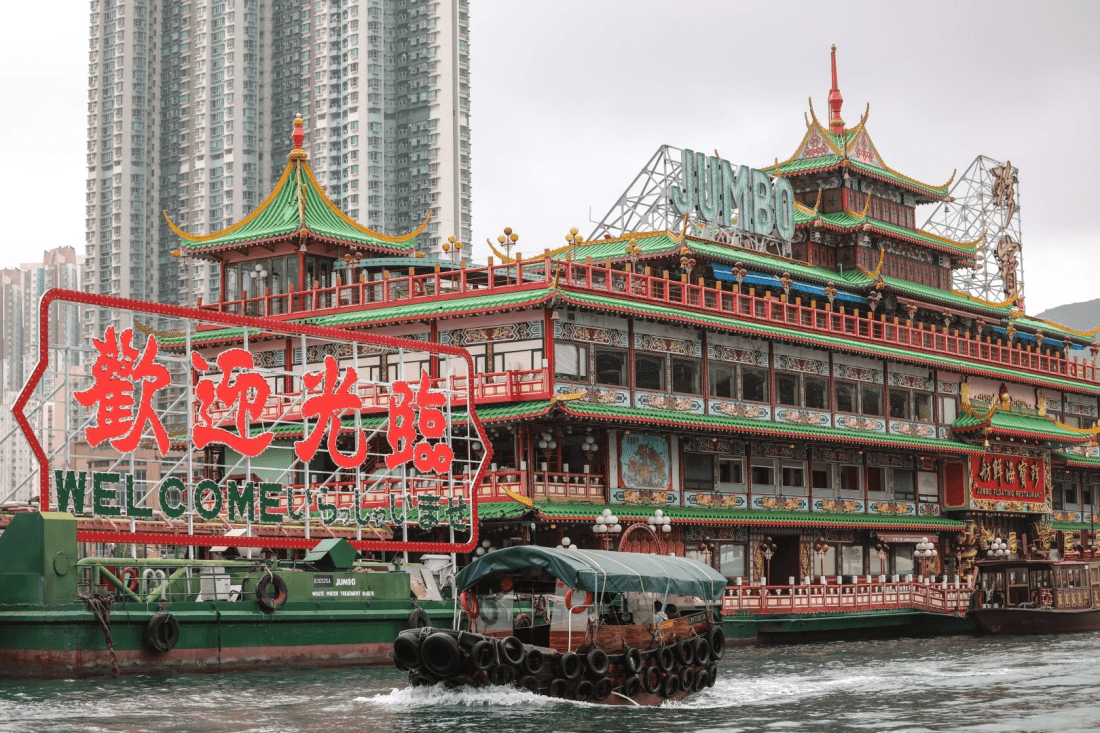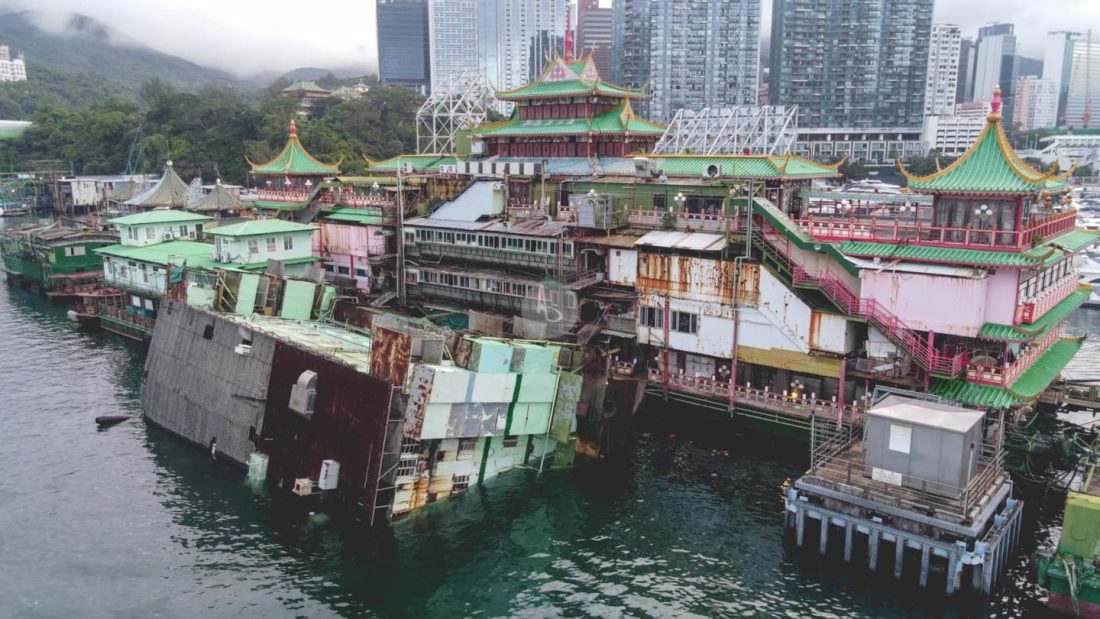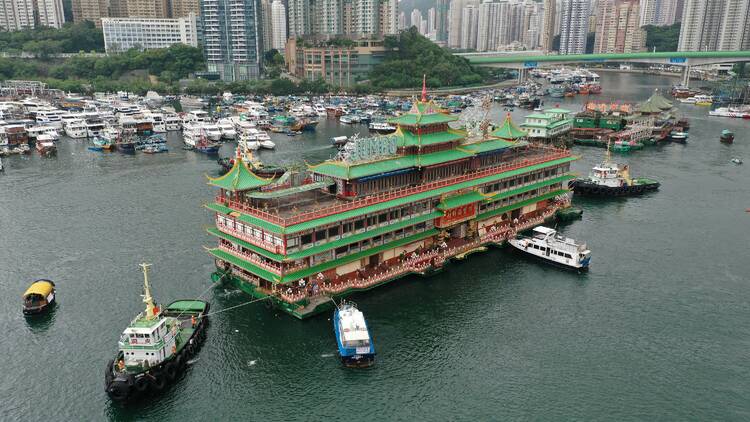On Monday night, sad news spread in Hong Kong.
Jumbo had come to an end.
Jumbo Floating Restaurant’s owner, Aberdeen Restaurant Enterprises, announced in a statement that the iconic Jumbo has sunk in the South China Sea on Sunday, after it was towed out of the city last Tuesday. The company did not disclose where the restaurant was destined to go, only citing that the vessel encountered adverse weather conditions when passing the Xisha Islands on Saturday, 18 June.
“Despite the efforts of the towing company responsible for the trip to rescue the vessel, unfortunately it capsized on Sunday,” the company said in the statement, adding that since the water depth at the scene exceeded 1,000 meters (3,300 feet), making it extremely difficult to carry out salvage works.
Jumbo, the romanisation of “treasures” in Chinese, is Hong Kong’s iconic floating restaurant that served locals and tourists for 46 years at the Aberdeen Harbour. With a seating capacity for 2,300 diners, Jumbo, officially named Jumbo Kingdom, is known as the world’s largest floating restaurant, and has been featured in many popular films.
Since yesterday, the press have pointed fingers at the government for its lack of effort in conserving the ship, Hong Kong’s icon. But if one were to put themselves in the government’s shoes, it is not easy for the government to operate Jumbo using the money from taxpayers endlessly.
The demise of the 46-year-old icon of Hong Kong has been caused by a mix of reasons.
Firstly, the consumption habits of Hong Kong people have changed. In the years since 1976 when Jumbo started its business, Hong Kong did not have many venues for entertainment and dinner, thus making it the go-to destination for dining. Today, there is an endless list of restaurants to select from. The mode of entertainment has also changed, in which people would use social media to interact with friends, instead of seeing one-another face to face.
Back then, people tended to have more free time, and it was certainly not rare to visit the Jumbo restaurant for the night out. Whereas people nowadays are so busy and would not spend the time traveling all the way to Aberdeen for a dinner. Due to these social changes in Hong Kong, the number of visitors had dwindled accordingly.

For years, Hong Kong has been relying on mainland China visitors for tourism. So, it was believed that a large margin of Jumbo’s income came mostly from mainland tourists. But despite the income from mainland tourists, Jumbo has been struggling financially and suffered accumulated deficits of more than HK$100 million since 2013.
Then the Covid-19 pandemic came as a huge blow.
Hong Kong’s strict quarantine restrictions, together with its border closure with mainland China under the country’s zero-Covid policy, blocking entry to the city is the major factor contributing to Jumbo’s closure in March 2020. All tourists coming to Hong Kong are required to undergo a compulsory quarantine of 14 days, the requirement was only lifted for a daily limit of 2,000 mainland visitors in September 2021. And when Chinese visitors return to mainland China, they have to be quarantined again. Who would be willing to travel to Hong Kong in such a situation?
Jumbo had been hard hit by this as tourists were its main source of customers, forcing its closure. A big ship like Jumbo would undoubtedly require costly maintenance, and so it would be unlikely that the company could pay for this with their zero income after its closure – and so this only sped up its demise.

Help arrived in 2020 when Chief Executive Carrie Lam announced in her policy address that in a bid to re-energize the Southern District, including revitalizing the Jumbo Floating Restaurant. It was after the owner of Jumbo agreed to donate the ship to Ocean Park to run it as a non-profit making project, with the government agreeing to provide assistance.
But on May 30, the operator of Jumbo, Aberdeen Restaurant Enterprises, announced that it was notified by Ocean Park that it was unable to find a partnering NGO to operate the ship, which resulted in giving up on this project. The next day, at a press briefing before the weekly meeting with the Executive Council, Carrie Lam said the government will not “force through an unfeasible proposal’ despite that idea being raised in her policy address. “We have clearly indicated that the government has no plans to invest money in the operation of the restaurant, as we are not good at running such premises,” she said.
The company said that it would tow the Jumbo out of Hong Kong for large-scale inspection and maintenance as well as looking for a suitable parking space to lower costs, while waiting for a new operator. But the company has declined to specify where the restaurant was destined to go. Just two days after the owner’s announcement, the kitchen barge of the floating restaurant sank partially overnight on 1 June 2022.
The ship departed the harbour on 14 June, and five days later, sank into the sea, according to the company. The legendary ship is now 3,300 feet below the South China Sea, and it is “extremely difficult to carry out salvage works”, the owner said in the statement made on Monday. A spokesman for the company told the press that he had no information on whether the salvage operation would continue.

The 4200 square-meter vessel has been a local icon for decades since its opening in 1976.
For half a century, Jumbo Floating Restaurant has experienced the ups and downs of Hong Kong. It has witnessed the growth of Hong Kong from an industrial center to an international financial hub, then to the return of Hong Kong to China; loyally serving itself as a collective memory of Hong Kongers. Each evening, the three-story floating restaurant with an ancient imperial style sparkled with numerous neon lights, lighting up the sea across Aberdeen Harbour.
Yet it cannot escape the ill fate, like any other “treasured” artifacts of the city.
“As a child, I felt that it was so special to eat on a ship,” a Hong Kong publisher said in recalling her memory of Jumbo. After reading the news that it would be towed away into the unknown, she has been sad ever since.
Who should be blamed for the demise of Jumbo?
The government, Covid-19, China’s zero-Covid policy, the Jumbo owner, Ocean Park, or Hong Kongers?
Truthfully, the fall of Jumbo is the ultimate reflection of Hong Kong’s values.
It is extremely ironic that Hong Kongers insist on the conservation of “Hong Kong value” over the past few years, but the fall of the Jumbo is a reflection of the lack of efforts of citizens.
Those who have been complaining about the government, have they themselves visited Jumbo in recent years to support it? Hong Kongers flocked to Aberdeen to take pictures of Jumbo only when they learned that it would leave the city, many of whom have never dined there. There was an outburst of posts by people on social media platforms, conveying their lament upon the sinking of the icon.
Ironically, situations as such only ring a bell as it is repeated each time when a heritage site is soon to be removed in Hong Kong. Hong Kongers along with the press only start to care about a situation once the incident has already occured, so what more could they demand for?

The ongoing problem in Hong Kong is that there is no drive in keeping the collective memories and history of Hong Kong. Nowadays, Hong Kongers are more focused and engrossed with pursuing material enjoyment and anything new. Whether it be new items, new projects or new housing estates.
The publisher said that “both rich people and poor people don’t care about Jumbo, Hong Kong is soulless. People care about things such as Michelin restaurants, the new hotel in Ocean Park. Abandoning the old stuff, and this is the core value of Hong Kong people, preferring new to the old.”
Hong Kong people keep complaining that mainlanders come to Hong Kong, accusing them of eroding the city’s core values. They say they love Hong Kong a lot. If so, when they saw Hong Kong’s collective memory being taken away, why didn’t they voice out?”
Few people care about the values of Hong Kong that do matter. If one never takes action or provides support to preserve Hong Kong’s “treasured” artifacts and destinations, they should not be qualified to comment on the loss of Jumbo.
End